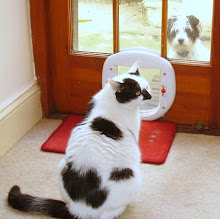Last weekend I heard the end of an interview with a Cruse Bereavement counsellor who said the first thing anyone who's been bereaved must do is talk.
Second she said is acceptance. Accept that your loved one has died and that you will feel – however you do feel. It's part of your love for them and nothing to be ashamed or frightened of.
Third, forgiveness.
Fourth, think of all the things you wish you'd done differently. Don't beat yourself up about them, but DO them differently next time.
Five - Don't look back but move on.
And I thought, that is such good advice, not just for bereavement, but for life.
I've recently been involved in several instances of lack of communication. The result has been unnecessary and very regrettable upset – or is, in the case of ongoing problems – silence. And in all cases this has been caused by a refusal on one part to discuss the problem.
I think emails are great as a form of quick communication, for business or arranging things, but in my experience, when there's a problem, they can be ambiguous. By that I mean that you can intend to say something but the recipient reads it differently (and can take offence where none is meant). In these instances, I've found that a phone call – or far better, actually meeting – is the best, if not the only way, to sort the problem out.
At choir last week, we went round the circle saying the next person's name. (This is a new choir, there are around 30-40 of us and so we don't tend to know each other's names.) We then stood in a circle and walked across the room saying the name of one of the other members and changed places. This meant that we stepped out of our usual places (comfort zones), sang with other people and actually knew what they were called. We talked to people we'd only ever looked at before. We all went for coffee afterwards.
Such a simple exercise broke down barriers. It made such a difference – we were suddenly discovering new friends.
Life is all about communication. So let's talk.
Thursday, 11 February 2010
Subscribe to:
Post Comments (Atom)
















21 comments:
Sadly, I know only too well how a situation cannot be resolved if one party remains silent and refuses to. But, when the other person is an adult, even though you know they are not being 100% true to themselves, even when you know, by being the older and more wiser of the two parties, that they will be the ones who are left with regrets, you HAVE to respect their choice to act as they do. Even though it breaks your heart.
Sorry, missed the word 'TALK' off the end of that first sentence.
PFG - yes you're so right. Doesn't half make life difficult though!
I'm not sure you can ever really accept a bereavement, but I certainly agree with the advice to keep talking. The exercise with your choir sounds an excellent way to break down boundaries between people.
Wow, I love the 'exercise' you did at choir; simple but brilliant.
Chris - I think bereavement is such a personal thing, but a friend of mine who's recently lost her husband said she found this practice worked for her. When my father died, I fought against it for years, and it took a long while to accept that he wasn't going to come back.
Talking is good in any situation. :)
The bereaved don't find it easy to talk and unfortunately not everyone is a good listener. :(
JJ - yes it worked so well it really did.
I took two years to finally mourne the deaths of my parents and other members of my family. The bereavement counsellor was terrific and yes talk is the best thing - but only when you are ready. It took me two years to get to that point. As with spats and others, the longer you leave it the harder it becomes to talk - we really can be quite silly sometimes. The feeling of relief when you do talk is immense and beats the stress of ignoring each other any day but still be dig our heels in. Great eh?!
I like the friends part the best. Friends make anything surviveable. Is that a word? If not, it should be.
I agree that communication is so necessary.
Emails can be so ambiguous. I've sent one or two (usually to my sister) and they've been taken the wrong way, followed by a lengthy silence.
Ak - I agree wholeheartedly with both of those statements!
MOB - good to see you again! I don't underestimate the difficulty of bereavement - so far I have fallen at the first hurdle whenever anyone close to me died, which is why I was so impressed by this interview. And you are so right over spats - the more you put off confrontation the worse it gets. As I well know. But yes - the relief when you do talk is so immense!
I agree that email communication can be hit and miss unless you know that person well. I have a relative who writes very 'to the point' emails which could be taken as abrasive. They don't mean to be - it just how they write.
Debs - oh that's awful isn't it? If it happens to me I rush to pick up the phone!
Lane - that's a very good point about knowing the person well. Even then it can be dodgy!
It once took me over 20 years to be able to talk about the loss of someone that I loved dearly and it felt so much better afterwards.
Great excercise at the choir - so simple but so effective.
Colette - I'm glad you were able to talk about your loved one eventually.
I took a class -- a million years ago in college -- on Death and Bereavement. All sorts of steps and timetables. Processes and procedures. At the time, it sounded wise, extremely intuitive. I believed in psycho mumbo-jumbo. Now, I'm older and wiser. Okay, I'm older. But the psycho stuff turned out to be Bunk. Just as everyone's death is personal, individual, so is grief and it doesn't adhere to a timeframe.
My father died November a year ago. We were close. Really close. My kids are teenagers, but this was their first brush with close death, and they all adored their grandfather. Each one of them had their own grief to handle. I kept my grief close -- even shallow, only allowing for the real tears inside the shower.
However, now that a year + has passed, it amazes me that folks act as though the mourning period should have ended. As though all that has passed should be just a normal thing. Death is normal, I won't deny. None of us will avoid it. Sorry, flash freezing doesn't count. But the length of time doesn't have a 'normal' code attached to it. Everyone gets through the grieving process at their own pace, and with their own amount of tears. Some do talk. A lot and to anyone/everyone who will listen. Then others . . . well, some of us sob in shower and wait for a time when normal really will feel normal again.
Sandra - I know what you mean. A lot of people seem to think that 6 weeks is 'enough' to mourn. My mum still mourns my dad who died 26 years ago. Of course everyone has their own way of dealing with grief and that takes - however long it takes. But all the people I've met recently who've dealt with bereavement - a counsellor and a humanist vicar - have said that very often the bereaved need licence to talk. The humanist said he could often see the stress coming off people when they talked about their loved one, because they didnt feel able to talk about him/her to their friends nad family. I hope your normal time becomes normal soon and that you can cherish those wonderful memories of your father without being torn apart by them.
Last week I send my younger brother of which there has been no contact for about 12-13 years, long story.... his choice...... anyways I sent him a lovely little note via facebook message (nope he aint added but you can still send a private message) just saying how much we still talk about him and love him no matter what and he will always be in my/our hearts........
well, he sent back the most vile foul disgusting nasty hateful message back LMFAO.....
I think it will be another 13 years before we touch base again LOL
x
Post a Comment